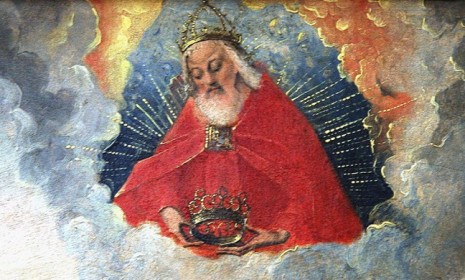Did God have a wife?
Yes, says a leading theologian. And she may have been edited out of the Bible

A free daily email with the biggest news stories of the day – and the best features from TheWeek.com
You are now subscribed
Your newsletter sign-up was successful
All the great religions of the world share the belief that there is but one solitary creator of the universe. But they could be mistaken, says Britain-based theologian Francesca Stavrakopoulou. "I have come to a colorful and what could seem, to some, uncomfortable conclusion that God had a wife," she says. Who is God's companion and where has she been hiding all these years? Here, an instant guide:
Who is God's wife?
Our creator's better half is a powerful fertility goddess named Asherah, says Stavrakopoulou. She was once worshipped as the companion of Yahweh, the name of God in the Hebrew bible.
The Week
Escape your echo chamber. Get the facts behind the news, plus analysis from multiple perspectives.

Sign up for The Week's Free Newsletters
From our morning news briefing to a weekly Good News Newsletter, get the best of The Week delivered directly to your inbox.
From our morning news briefing to a weekly Good News Newsletter, get the best of The Week delivered directly to your inbox.
What's the evidence for this?
The existence of an ancient goddess named Asherah has been acknowledged for some time, but Stavrakopoulou has unearthed fragments of ancient pottery in Syria that date back to around 800 B.C. that refer to "Yahweh and his Asherah" — implying that the two were a "divine pair." There are also lines in the Bible that refer to worship of the goddess in Yahweh's temple in Jerusalem. "In the Book of Kings," says the theologian, "we're told that a statue of Asherah was housed in the temple and that female temple personnel wove ritual textiles for her."
If she's really God's wife, why isn't she in the Bible more?
It sounds a bit "Dan Brown-ish," says The Huffington Post, but "the Bible's editors may very well have wiped her almost clean from the document." Several Old Testament experts say the ancient authors who collated the texts either cut out references to Asherah, or translated her name as "Sacred Tree."
A free daily email with the biggest news stories of the day – and the best features from TheWeek.com
Why would she have been cut out of the Bible?
After the destruction of the Temple in Jerusalem in 586 B.C., Israelite leaders emphasized strict monotheism in order to unite their different tribes. The idea, says theologian Aaron Brody, was that there's "one god not only for Judah, but for all the nations." Before that, polytheism — or the worship of a number of gods — was quite common. Several of the ancient Israelite gods, such as El, Baal, and Molek, were similarly cast aside in favor of Yahweh.
Should we be sceptical of Stavrakopoulou's claims?
The devout may wish to know that the theologian is an atheist who says her research is a "branch of history like any other." She has also said that Eve should not be blamed for the Fall of Man, as she had been "very unfairly maligned as the troublesome wife."
Sources: Discovery, Huffington Post, TIME, Daily Mail
-
 Corruption: The spy sheikh and the president
Corruption: The spy sheikh and the presidentFeature Trump is at the center of another scandal
-
 Putin’s shadow war
Putin’s shadow warFeature The Kremlin is waging a campaign of sabotage and subversion against Ukraine’s allies in the West
-
 Media: Why did Bezos gut ‘The Washington Post’?
Media: Why did Bezos gut ‘The Washington Post’?Feature Possibilities include to curry favor with Trump or to try to end financial losses